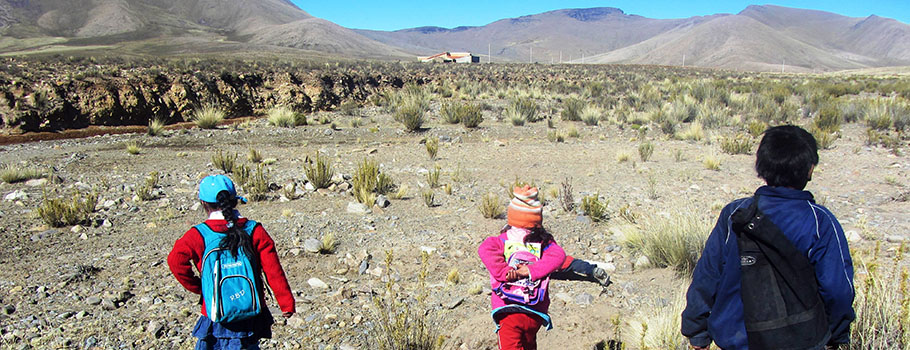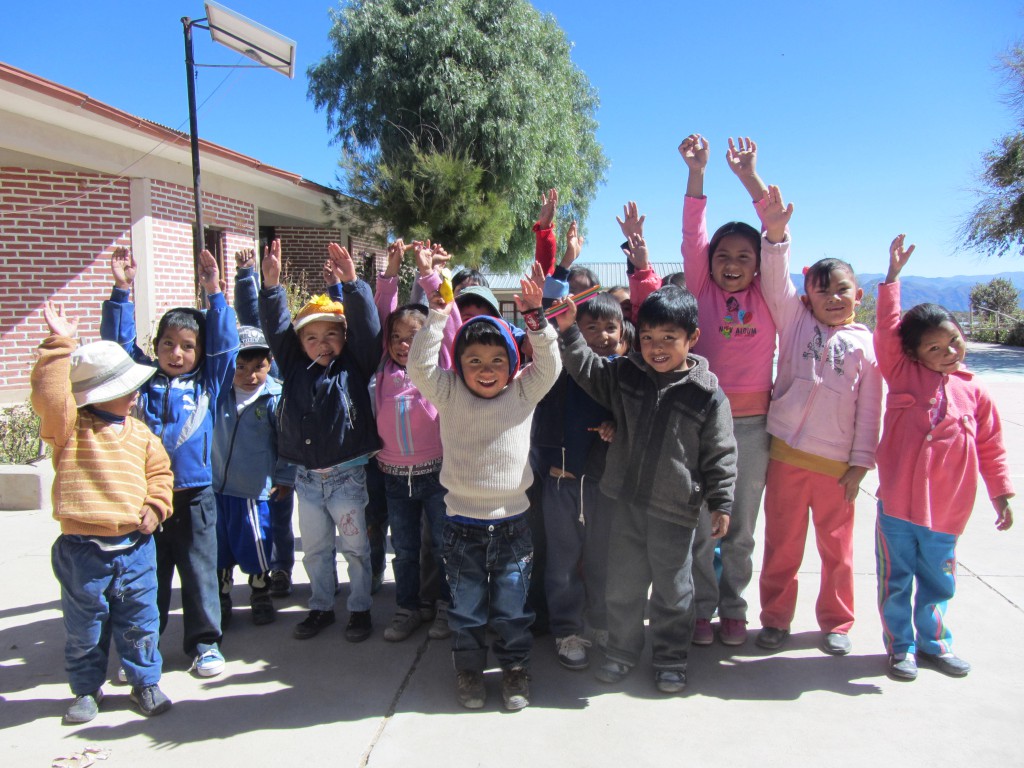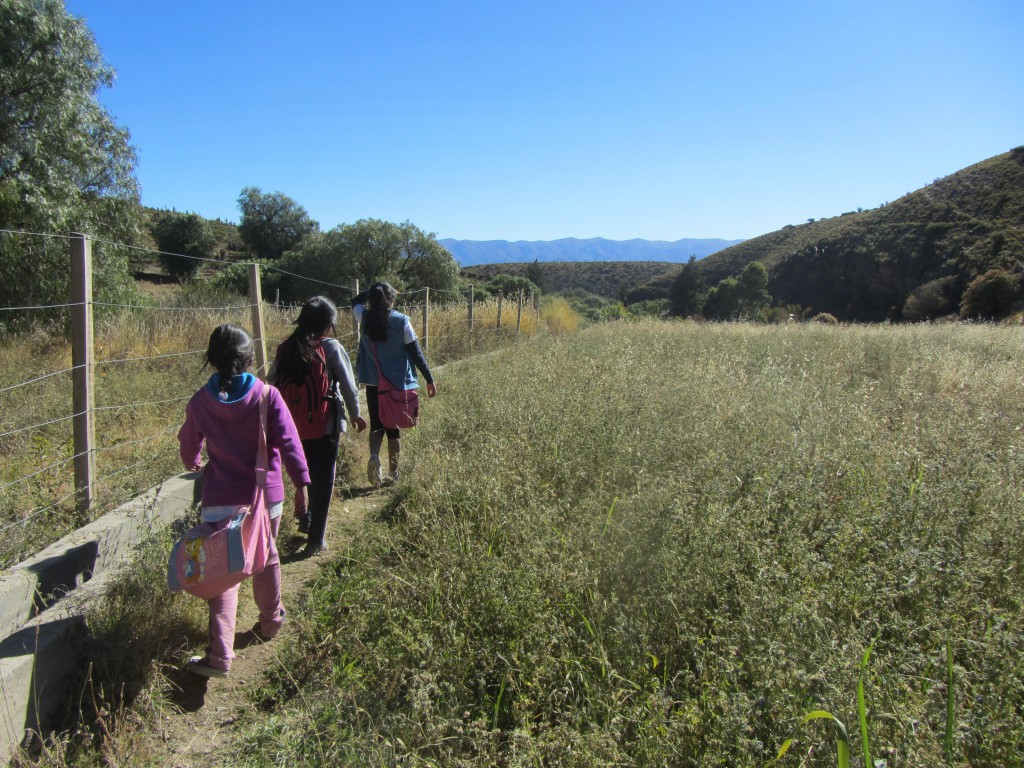
With the ‘“Weekly Boarding in Indigenous Families” program we enable particularly disadvantaged children in the country to complete a basic education while at the same time create socially prestigious employment and economic opportunities for rural women in poor regions. The close onsite cooperation with the program’s counties ensures sustainability.
Particularly disadvantaged groups in Bolivia
Poverty and inequality are perpetuated when access to a solid basic education is denied from the outset. In Bolivia the children who are the hardest hit are the thousands who live in remote farming communities where there is no school (or only a school leading to the 3rd or 5th year school years). When the arduous road to the nearest middle school takes longer than an hour the difficulty entailed in reaching the school sees high numbers of students quickly dropping out of their education. Girls in rural areas are particularly affected by this issue. Bolivia has little more than a tenth of the population of Germany but three times as large an area with very bad roads.
Further development of an Andean tradition
With the “Weekly Boarding in Indigenous Families” program the Fundación Pueblo offers a solution to the problem, working within the context of Andean traditions to create a new social service in rural areas. The families in the remote farming communities are brought together with peasant women in the next village where there is a larger school that offers a complete basic education of at least 8 years. The students from the surrounding remote farming communities who want to complete their basic education are now able to ‘weekly board’ with host mothers, returning to their families at the weekend. The relationship of trust between the birth parents and the host mothers connects to the Andean tradition of ‘’Uta Wawas’’, The local onsite coordinator of the “Weekly Boarding in Indigenous Families” program supports the host mothers and controls the quality of the accommodation, the food and care for the children. He or she also observes the children’s school performance.
Unlike traditional boarding schools the “Weekly Boarding in Indigenous Families” program is more pastoral and personal. A host mother does not take more than four children, indeed on average less than four. In “Weekly Boarding in Indigenous Families” there is no cultural disconnect for the children since the host mothers – mostly indigenous peasant women – come from the same rural milieu as the students themselves. The return to the students biological family at the weekend is protected and ensured. The simple houses of the host mothers meet with the foundation’s conditions for appropriate accommodation and care.
Children and Indigenous Women are the direct beneficiaries
The “Weekly Boarding in Indigenous Families” gives children an alternative to child labour. It also may prevent a subsequent migration of uneducated workers to the slums of the big cities.
For the host mothers “Weekly Boarding in Indigenous Families” opens up the opportunity to gain respected employment based on their abilities and inclinations. For each child they take care of they receive a sum of money to cover the cost of the students food plus a small surplus as payment for their services. This income strengthens the role of the women in the community where as a rule there are few alternative sources of income. The visiting mothers use their income mainly for the purchasing of school supplies and clothes for their own children, which thus also benefits the project.

Little students in the Palqui school
A new social service as a local economic factor
Whatever the host mothers need for providing food for their weekly boarders they buy in large part from their neighbours in the village – potatoes, vegetables and eggs etc.,. This has a significant multiplier effect which contributes to the local economic development in the villages. For this reason the “Weekly Boarding in Indigenous Families” program is much appreciated by the community elders and district administrators, who see the importance of new service industries in poor regions which spike income and employment opportunities.
From a pilot project to a self-sustainable project
The first “Weekly Boarding in Indigenous Families” program was established in the home country of Fundación Pueblo in the Yungas valleys of the department of La Paz, it further developed in several years based on this field proven model. As part of the nationwide information and lobbying by the Fundación Pueblo the model has been able to be implemented in numerous districts in the departments of Potosí and Tarija. It has been adapted to the particular cultural contexts of the region in which the program is based and successfully implemented.
In order that projects do not die after the initial financial funding by Fundación Pueblo, we involve the relevant districts for several years from the very beginning in every “Weekly Boarding in Indigenous Families” program. The counties which have been inducted in the ‘90s decentralisation, which has again been reaffirmed in the new constitution of 2009, have been given considerable budgetary funds from the revenue sharing between the national government and the local authorities. New “Weekly Boarding in Indigenous Families” programs are therefore only funded by the Fundación Pueblo in counties that are willing to take out a typically three-year cooperation agreement, during which the administrative and financial responsibility of the counties gradually increases until the eventual complete take over of the facilities. This sustainability strategy of the Fundación Pueblo requires a high level of local politics of information and persuasion. The continued existence of most “Weekly Boarding in Indigenous Families” programs after the co-financing by the foundation has ended has shown that this effort is worthwhile and ensures that women and children remain beneficiaries well over the initial commitment of Fundación Pueblo has ended.
South-South cooperation
Since the regional organisation of the United Nations (CEPAL / ECLAC) awarded the “Weekly Boarding in Indigenous Families” program as being one of the best social innovations in Latin America in 2007, many neighbouring countries have expressed interest in the program. In recent years employees of Fundación Pueblo with the invitation of ECLAC have explained their model to different neighbouring countries. This has in some cases already resulted in South-South cooperation, with “Weekly Boarding in Indigenous Families” programs growing in countries such as Peru and Mexico.

Children on their way home after a week of school in Palqui



